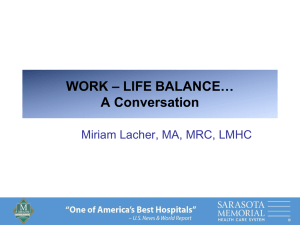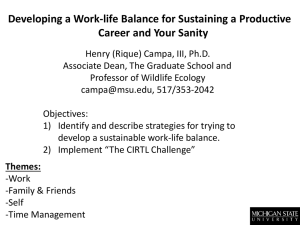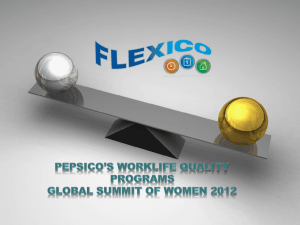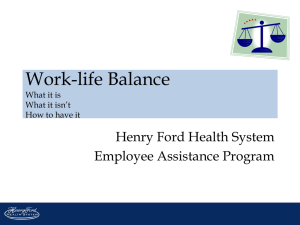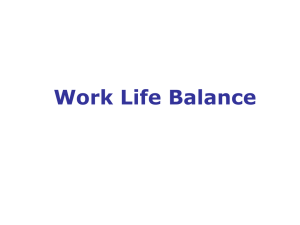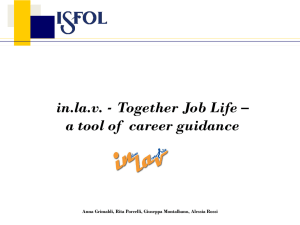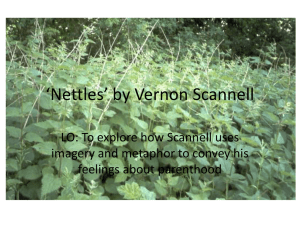Call for Proposals Building Bridges: Sharing Pathways to Work
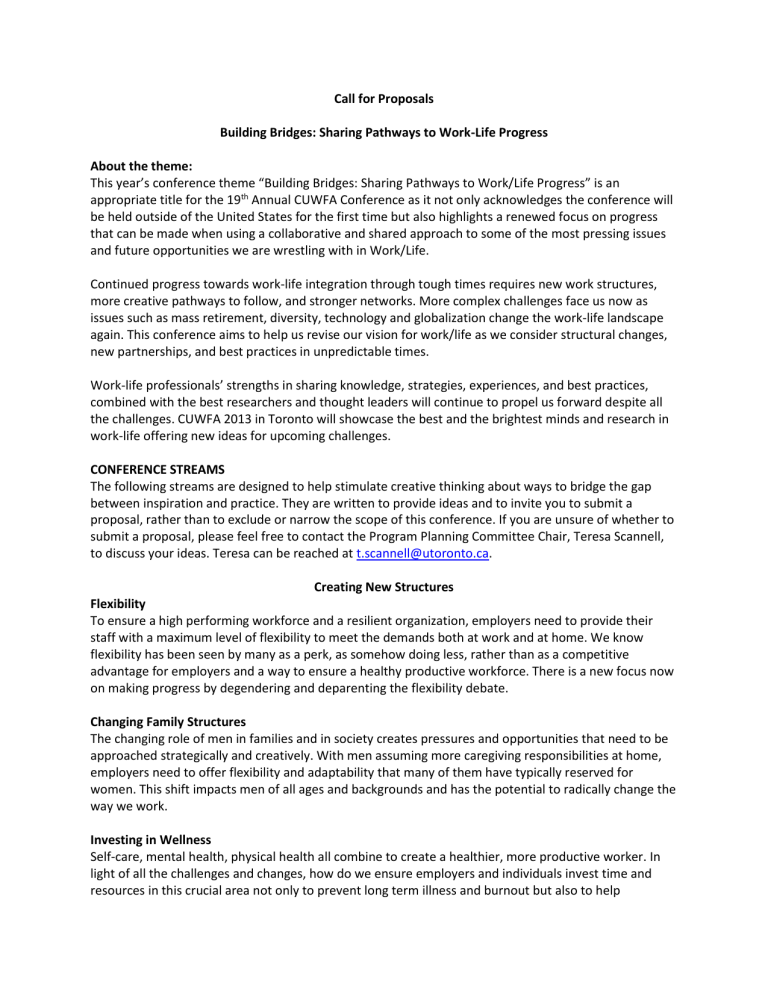
Call for Proposals
Building Bridges: Sharing Pathways to Work-Life Progress
About the theme:
This year’s conference theme “Building Bridges: Sharing Pathways to Work/Life Progress” is an appropriate title for the 19 th Annual CUWFA Conference as it not only acknowledges the conference will be held outside of the United States for the first time but also highlights a renewed focus on progress that can be made when using a collaborative and shared approach to some of the most pressing issues and future opportunities we are wrestling with in Work/Life.
Continued progress towards work-life integration through tough times requires new work structures, more creative pathways to follow, and stronger networks. More complex challenges face us now as issues such as mass retirement, diversity, technology and globalization change the work-life landscape again. This conference aims to help us revise our vision for work/life as we consider structural changes, new partnerships, and best practices in unpredictable times.
Work-life professionals’ strengths in sharing knowledge, strategies, experiences, and best practices, combined with the best researchers and thought leaders will continue to propel us forward despite all the challenges. CUWFA 2013 in Toronto will showcase the best and the brightest minds and research in work-life offering new ideas for upcoming challenges.
CONFERENCE STREAMS
The following streams are designed to help stimulate creative thinking about ways to bridge the gap between inspiration and practice. They are written to provide ideas and to invite you to submit a proposal, rather than to exclude or narrow the scope of this conference. If you are unsure of whether to submit a proposal, please feel free to contact the Program Planning Committee Chair, Teresa Scannell, to discuss your ideas. Teresa can be reached at t.scannell@utoronto.ca
.
Creating New Structures
Flexibility
To ensure a high performing workforce and a resilient organization, employers need to provide their staff with a maximum level of flexibility to meet the demands both at work and at home. We know flexibility has been seen by many as a perk, as somehow doing less, rather than as a competitive advantage for employers and a way to ensure a healthy productive workforce. There is a new focus now on making progress by degendering and deparenting the flexibility debate.
Changing Family Structures
The changing role of men in families and in society creates pressures and opportunities that need to be approached strategically and creatively. With men assuming more caregiving responsibilities at home, employers need to offer flexibility and adaptability that many of them have typically reserved for women. This shift impacts men of all ages and backgrounds and has the potential to radically change the way we work.
Investing in Wellness
Self-care, mental health, physical health all combine to create a healthier, more productive worker. In light of all the challenges and changes, how do we ensure employers and individuals invest time and resources in this crucial area not only to prevent long term illness and burnout but also to help
employees operate at their highest level of productivity and wellness and to foster organizational resilience?
Exploring New Destinations
Dual Careers
Dual career partners need all-inclusive support as they often bring complex issues to the process of relocating to a new life and labor market. Economic changes and uncertainty create a more challenging job search situation. Family disruption at a time when families need even more stability is a challenging issue. How can we continue to support Dual Career families to help them not only survive, but thrive.
Diversity
Diversity is diverse! From same sex couples, and differing socio-economic groups, to clashing values and changing traditions, from different generations to varied ways of thinking - as we approach work-life solutions, the ability to factor in diversity and truly embrace it will strengthen our programs and contribute to strong organizations.
Retirement and Emeriti Programs
As the impact of the baby boomers retiring is creating unprecedented challenges and changes, what programs, research and knowledge now applies? How do we make retirement easier, more meaningful and smoother for both our valued, long term employees and our organizations? What are the opportunities, strategies and possibilities available now?
Expanding Connections and Networks
Global Work-Life strategies/issues/programs
Globalization and technology have allowed us to expand our organizations to regions of the world that raise a different set of issues and opportunities. Universities and colleges are offering programs overseas and setting up campuses in foreign cultures. Opportunities abound and the sky is the limit! How does this impact work-life programs and what are the issues to explore?
Social Media and work-life
Social media presents unprecedented opportunities to reach out and collaborate, share, and have vibrant, engaged conversations across our organizations and across the world. Now there are no barriers and anything is possible but how can we selectively and intelligently protect ourselves from wasting time by distinguishing between fads and long term effective strategies? What is working well and what is possible now?
Technology
While increasing technology has made work easier, it has also brought stress and endless connectivity to the point where work is almost unworkable for many. How can we leverage technology to further the work-life agenda while protecting people from the 24/7 demands of work? How has technology impacted work-life? What are the issues and how do we move forward?
Successful presentations will address innovative developments, best practices, and the skills, knowledge, and abilities necessary to enable work/life professionals to integrate their programs into higher education to help grow organizations that are vital, dynamic and responsive.
Collaborations across institutions are highly encouraged. Work/life practitioners, researchers, human resource professionals, women’s commissions, faculty, staff and students are welcome to submit proposals. Sessions will be held Wednesday, June 5 through Friday, June 7, 2013.
DEADLINE FOR SUBMISSION
January 25, 2013
NOTIFICATION OF ACCEPTANCE
Late February, 2013
CRITERIA FOR SUBMISSION REVIEW AND SELECTION
Clarity and coherence of submission
Relevance and usefulness to the intended audience, e.g.: o Specific practical sessions (e.g., problem-solving, implementation, etc.) o Research-based/data-driven sessions
Presentation approach and level of participant engagement in the session
Contribution to scholarship and research and/or new innovative practice(s) in the work/life arena
Relevance to the conference theme (a literal/linear connection is not required)
Overall quality of proposal
Extent to which proposal captures emerging trends in research and practice
Extent to which process, project, or innovation can be replicated or modified by other postsecondary institutions
Please note: We expect to select up to eighteen outstanding sessions for the three-day conference. A workshop proposal may satisfy conference criteria, but it may not be selected due to the limited number of scheduled workshops.
You may submit your proposal online at http://www.provost.utoronto.ca/link/events/cuwfa.htm
or by email to t.scannell@utoronto.ca
. Conference proposals will consist of four parts:
1.
A short session title,
2.
A brief session description suitable for the conference program (150 words),
3.
A longer abstract that includes session goals (350 words), and
4.
Presenter bios (100 words per person).
Your proposal should be clear and concise. Reviewers will look favorably upon proposals that:
1.
Offer theories, research findings, practical models, and/or strategies that reflect one of the conference theme/subthemes and have proven effective,
2.
Are innovative and interactive, and
3.
Identify the intended audience and goals for the session (including what attendees will gain from going to the session).
Presentations must be educational and not a platform for product or service promotion. Due to timing constraints, we may not be able to accept all meritorious workshops.
Session Formats
There are three session formats from which to choose: (1) 90 minute workshops, (2) 60 minute seminars, and (3) 60 minute roundtable discussions. Please select the format that will best facilitate participants’ understanding and potential use of your work. One way to effectively engage participants across the different formats is to have them explore ways to apply your information and resources to their own institutional settings. Please note that the Conference Program Committee may request that your session format be modified to fit the final conference program.
Workshop (90 minutes)
Workshops provide participants an opportunity to engage the facilitators and each other in learning about the session topic and applying it to their unique situations. It is suggested that workshops should begin with a brief framing of an issue, theory, model, or process and include data, benchmarks and challenges, practical examples, and evidence that you and the participants can then use to examine and discuss the topic. If you are sharing a campus-based project, provide an opportunity for workshop participants to apply the concepts to their situations. For example, if your work takes place at a research university, please facilitate discussion among participants as to how community colleges, liberal arts colleges, and comprehensive institutions might adapt your work to account for institutional differences. If your work is better suited to a particular type of institution, please make that clear.
Seminar (60 minutes)
These sessions should allow 20 minutes to provide research findings or overview of a model, 20 minutes to discuss practical applications, and 20 minutes for participant discussion. Research information or models of institutional reform or assessment can stimulate creative problem-solving discussions. Data, findings, and application should be presented in ways that are accessible to participants and allow them to engage in a discussion about the implications of your findings. Models might be presented visually as well as verbally and include strategies for implementation.
Roundtable Discussion/World Café Format (20 minutes; roundtables of 8; no audio-visual)
Roundtables are facilitated discussions among colleges with a common interest. They provide a valuable forum to network and reflect upon important topics in an informal setting. Roundtable discussions may range from a new area or initiative related to a conference theme to sharing best practices for replication.
BEST PRACTICE (can be any of the above options. We may request a copy of your presentation paper to be published on the CUWFA website)
SUBMISSION INFORMATION
Submit your Conference Proposal online at http://www.provost.utoronto.ca/link/events/cuwfa.htm
or by email to t.scannell@utoronto.ca
. You will receive an email confirmation that your proposal has been received.
Not sure about submitting a proposal?
If you would like to discuss ideas or questions about proposals, topics, collaborations, or the submission timeline, please contact Teresa Scannell ( t.scannell@utoronto.ca
). Teresa will be happy to discuss your questions.
Condition of Acceptance
The CUWFA 2013 Conference Committee will require electronic copies of workshops and seminar presentations via an attachment to email no later than Friday, April 26, 2013. Email your presentations to Teresa Scannell t.scannell@utoronto.ca. All presentations will be distributed to participants on flash drives. By submitting a Conference Proposal presenters are agreeing to this condition.
